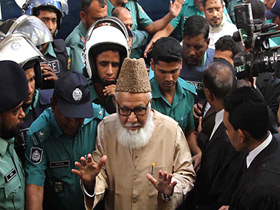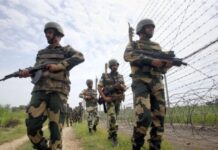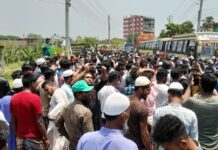The defence counsel for Motiur Rahman Nizami, the supremo of villainous 1971 Al Badr, on Sunday contended that his client deserves acquittal from the war crimes charges as the prosecution case appears ‘make over’.
Defence counsel Tajul Islam came up with the claim before the International Crimes Tribunal-1 while closing the rehearing on defence case summing-up arguments based on charges along with law-point interpretations that exhausted four working days.
With detained Nizami, now ameer of Jamaat-e-Islami, in the dock, defence counsel Tajul Islam rebutted prosecution charge against his client of delivering inciting speeches before the members of ICS as its president time to time during the Liberation War and said the speeches that were made by Nizami do not meet the criteria of genocide as prescribed under the International Crimes (Tribunals) Act 1973.
“I didn’t find in any of his speeches intent to destroy, in whole or in part, a national, ethnic, racial, religious or political group,” argued Tajul, referring to the ICT Act.
He said incitement to genocide is only an offence under the International Law which must be made direct and in public as well. “Had Nizami’s speeches specifically called for committing any criminal offence, only then it would have qualified for the charge of incitement?”
In this regard, the prosecution had miserably failed to pinpoint any of the groups Nizami had targeted to destroy or cleanse, argued Tajul.
Referring to the newspaper clippings containing the 1971 speeches made by Nizami as ICS president, it was alleged that Nizami had made inciting speeches calling upon the members of ICS, a student wing of Jamaat-e- Islami, to save Pakistan at any cost, branding the freedom fighters as miscreants and Indian agents. Nizami had also blamed the people struggling for freedom as enemy of Islam for taking arms to fight against the occupation forces that perpetrated the crimes against humanity, including genocide, in collaboration with its auxiliary outfits like infamous Razakar, Al Badr and Al Shams.
Refuting the charge of liability for crimes against Nizami as commander or superior officer under section 4 (1) and (2) of the ICT Act, Tajul claimed that such charge can’t be imposed on a civilian as it is applicable only for army officers.
He said the prosecution had played foul in implicating Nizami of liability for crimes, terming it ‘fake’ as the Investigation Officer (IO) of the case during cross-examination had disclosed that Nizami during the whole war period of nine months’ remained simply a civilian.
Encountering the prosecution argument identifying Nizami as commander–in-chief of Al Badr, an official armed para militia outfit, by dint of his position as ICS president, Tajul said Al Badr was a separate wing under Razakar raised through an Ordinance promulgated by the Pakistan junta to combat freedom fighters and had its own command structure with army personnel, referring to a book titled “The Betrayal of East Pakistan” authored by Gen AAK Niazi, the defeated head of Eastern Command in 1971.
The defence counsel claimed that the creation of Al Badr was a brainchild of the Pakistan army and Nizmai had no connection with it.
Besides, he said the prosecution had failed to provide any official document to prove that Nizami was made the chief of Al Badr, except referring to some books published after 1986 when Nizami had emerged in the political arena as a ‘potential’ leader of Jamaat-e-Islami.
Closing the rehearing on defence case summing–up argument, the tribunal adjourned the proceedings till Monday for submission of the prosecution reply to the defence argument.
A former minister during the past BNP-Jamaat rule, Nizami, since condemned to death in the Chittagong 10-truck arms haul case, faces 16 counts of charges based on 16 separate incidents of crimes against humanity, in which at least 600 unarmed people were killed and 31 women raped during the Liberation War.
The prosecution, however, did not press one charge (charge No. 5–Ishwardi mass killing) as they failed to produce its witnesses.
On May 28, 2012, the tribunal indicted the Jamaat chief for committing crimes against humanity, including genocide and killing of intellectuals, to make the country intellectually bankrupt at the fag end of the Liberation War, knowing their ignominious defeat.
Nizami was arrested in front of the Jatiya Press Club on June 29, 2010, after a magistrate court in Dhaka issued a warrant of arrest in connection with a criminal case over hurting the religious sentiment of Muslims.
Later, responding to a prosecution plea, the tribunal on July 22 the same year shown him arrested in the war crimes case.
Source: UNBConnect










